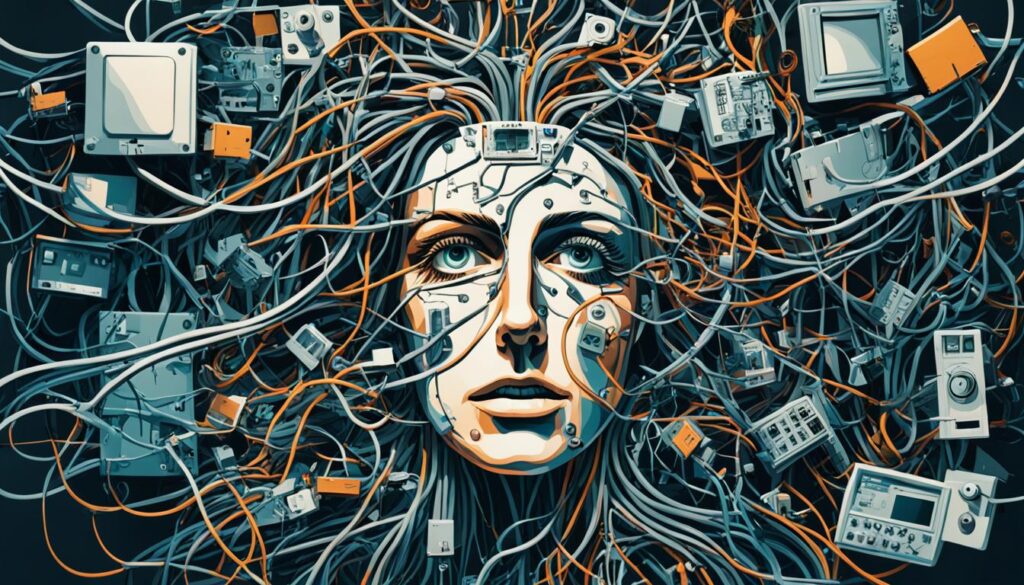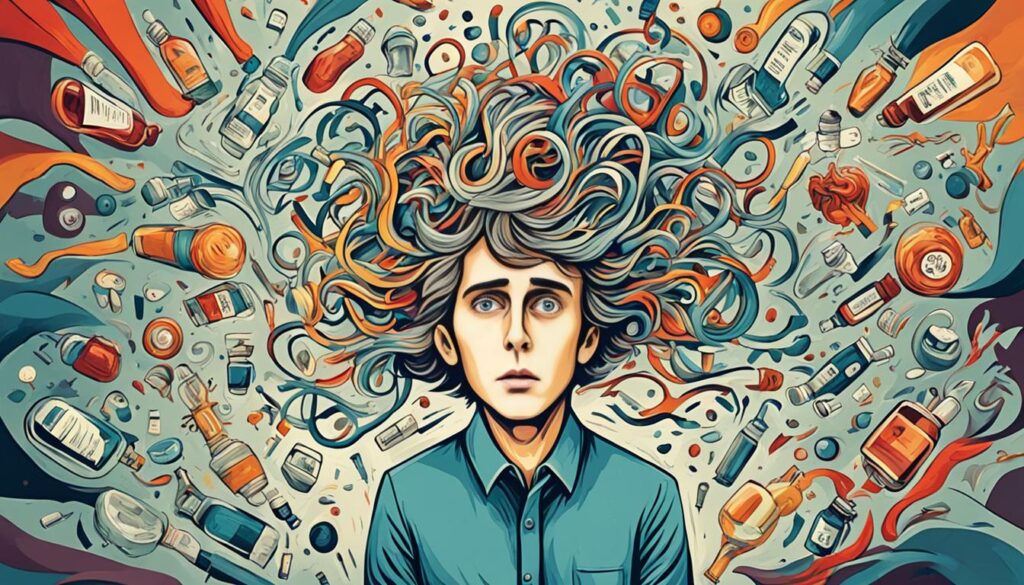Understanding OCD: Is It a Mental Disability?

About 2.2 million adults in the U.S. are affected by obsessive-compulsive disorder (OCD). It’s crucial to understand if OCD is seen as a mental disability. This article will look into what OCD is, its signs, and its effects on mental well-being. We’ll explore treatments and the debate about OCD as a mental disability. Let’s dive into the details of OCD and learn more about this condition.
What is OCD?
OCD stands for obsessive-compulsive disorder. It’s a mental health condition marked by obsessions and compulsions. Obsessions are those thoughts that keep coming back, ones we don’t want. They make us anxious. Compulsions are actions we repeat to try to make that anxiety go away.
People with OCD might be afraid of germs or worry about losing control. They could have aggressive or forbidden thoughts. These thoughts can make everyday life hard. To deal with their worries, they might clean a lot, check things over and over, count things, or pray a lot.
OCD affects someone’s life, but it isn’t called a mental illness like other diagnoses. Still, it can have a big impact. It can change how well someone can feel and do things day-to-day.
| Obsessions | Compulsions |
|---|---|
| Fear of germs or contamination | Excessive cleaning |
| Fear of losing control | Checking |
| Aggressive thoughts | Counting |
| Taboo thoughts | Praying |
Symptoms of OCD
OCD symptoms include obsessions and compulsions. Obsessions are intrusive thoughts that cause distress. They make it hard to focus or enjoy life. Compulsions are actions done to ease the anxiety from obsessions.
OCD severely affects mental health. It leads to emotional and psychological issues. The anxiety and stress can make people feel helpless and sad.
People with OCD often feel alone and misunderstood. They may be afraid to share their feelings. This fear can make them feel embarrassed and make it hard to get help.
OCD can bigly impact someone’s life, even though it’s not a mental health disability by itself. If you have OCD symptoms, getting help from a mental health professional is key. They can offer support and treatment options.

Case Study: Sarah’s Journey with OCD
“Every waking moment was consumed by overwhelming thoughts and constant rituals. I couldn’t leave the house without performing a series of complex checks, constantly doubting myself and fearing the worst. It felt like I was trapped in a never-ending cycle of fear and compulsion. Seeking therapy and connecting with a support group has been instrumental in helping me manage my symptoms and regain control of my life.”
Risk Factors for OCD
The exact cause of OCD is not fully known. However, certain factors can make someone more likely to get it. If OCD runs in your family, you might be at a higher risk. This hints at a possible genetic link in OCD’s development. Stressful life events, like trauma or big changes, can also trigger OCD symptoms.
OCD isn’t seen as a disability on its own. But, its effects on daily life could make someone eligible for disability rights. Whether OCD is considered a disability depends on how it affects a person. It also depends on their ability to do essential tasks at work or elsewhere.
It’s important to know the risk factors of OCD. This can help identify who might need extra support. Knowing these risks helps in treating OCD. It also aids in raising awareness about the condition. Finally, it helps in advocating for those with OCD.
Treatment of OCD
OCD is managed with medication and psychotherapy. Medications like SSRIs are often used. They help control serotonin in the brain, easing anxiety and obsessive thoughts.
Psychotherapy, especially CBT and ERP, is crucial. CBT changes negative thoughts and behaviors. ERP exposes people to their fears without letting them act on compulsions.
These treatments reduce symptoms and improve life quality. But, OCD is not a mental illness. It’s a condition that can be managed with the right treatment.
Overview of OCD Treatment Options
| Treatment Option | Description |
|---|---|
| Medication | SSRIs (Selective Serotonin Reuptake Inhibitors) are commonly prescribed antidepressant medications that help regulate serotonin levels in the brain, reducing anxiety and obsessive thoughts. |
| Psychotherapy | Cognitive-Behavioral Therapy (CBT) helps individuals identify and challenge negative thought patterns and behaviors, while Exposure and Response Prevention Therapy (ERP) involves gradually exposing individuals to their obsessions and preventing the accompanying compulsive behaviors. |
| Alternative Therapies | In certain cases where traditional treatments may not be effective, alternative therapies such as Repetitive Transcranial Magnetic Stimulation (rTMS) and Deep Brain Stimulation (DBS) can be considered. These treatments involve stimulating specific areas of the brain to alleviate symptoms. |
People with OCD should talk to a professional. They can find the best treatment plan. The right mix of medications and therapy helps manage OCD well.
Other Treatment Options for OCD
Apart from medication and psychotherapy, there are more ways to help those with OCD. These methods are useful especially when usual treatments don’t work well. Two promising options are repetitive transcranial magnetic stimulation (rTMS) and deep brain stimulation (DBS).
rTMS uses magnetic fields to target certain brain areas. It aims to lower OCD symptoms by changing brain activity. Although still experimental, rTMS could help those who haven’t seen results from other treatments.
DBS offers hope for severe OCD cases. It works by placing electrodes in the brain to control activity and ease symptoms. Like rTMS, DBS is experimental and mainly for those who haven’t found relief elsewhere.
Both rTMS and DBS need a doctor’s advice before trying. They carry risks and aren’t for everyone. Deciding to try these should be a joint choice with a specialist who understands your situation.
Even though these treatments are new, their development is vital. It shows the growth of research in fighting OCD. Yet, it’s important to note that OCD isn’t seen as a mental health disability.
Different treatments work differently for everyone with OCD. Talking to a healthcare professional is key. They can help choose the best option based on your specific case and needs.
Causes and Biology of OCD
OCD affects millions around the world and may have a biological basis. Research points to changes in the brain’s chemistry and function as key factors. These contribute to how OCD symptoms appear and impact individuals.
Studies using functional brain imaging have shed light on OCD. They show unusual activity in areas of the brain linked to making decisions, forming habits, and handling emotions. This includes the caudate nucleus and the orbitofrontal cortex.
Genetics might also influence who gets OCD, though experts are still figuring out which genes matter. If someone in your family has OCD, you’re more likely to have it too. This supports the idea that genetics play a part in OCD.
While OCD is a major mental health issue, it’s not seen as a mental disability. Still, understanding its biological roots and factors is key. This knowledge is essential for creating better treatments and maybe even preventing OCD.
Research Highlights:
“Functional brain imaging has provided valuable insights into the abnormal brain activity associated with OCD, specifically in the caudate nucleus and orbitofrontal cortex.”
“Individuals with a family history of OCD are at an increased risk of developing the condition, suggesting a genetic component.”
Risk Factors and Complications of OCD
OCD isn’t seen as a mental illness by itself. But people with OCD may face complications affecting their mental health and happiness.
Risk Factors for OCD
Having a family member with OCD puts you at higher risk. This shows a connection between OCD and genetics.
Stressful events in life can also raise your chances of getting OCD. Things like trauma or big life changes can start OCD symptoms.
Complications of OCD
Those with OCD face challenges that can disrupt daily life. They deal with a variety of problems.
“OCD can take up lots of time, with individuals spending hours on rituals. This can affect work, school, and key duties, leading to missed deadlines or goals.”
“OCD rituals, like too much handwashing, can cause health issues. For example, using cleaning products often can lead to skin problems.”
OCD can also harm relationships. The need for rituals can cause misunderstandings and conflicts with others.
Additionally, it can make focusing hard at school or work. People may find it tough to finish tasks or stay productive.
All these complications can negatively affect one’s life. This can lead to isolation, depression, and anxiety. It’s crucial to address these issues to help those with OCD.

In the next section, we’ll look at treatments for OCD. We’ll see how those with the condition can get support and manage their symptoms.
Conclusion
OCD, or obsessive-compulsive disorder, is a mental health issue. It involves obsessions and compulsions. Even though it’s not seen as a mental disability, it greatly affects a person’s wellness and everyday life. These unwanted thoughts and repeated actions can cause a lot of stress. They also get in the way of doing normal things.
Luckily, there are good treatments for managing OCD. Medication and types of therapy, like cognitive-behavioral therapy, can help a lot. They lessen symptoms and bring relief. It’s key to get help from a professional for the right diagnosis and treatment.
More study on OCD’s biology is needed to find better treatments. Knowing more about what causes OCD is important. It helps in giving the right support and care to those who have it.
If you or someone you know shows signs of OCD, getting help is important. Reach out to a health care expert. With proper treatment and support, people with OCD can have a good life. They can handle their symptoms well.






